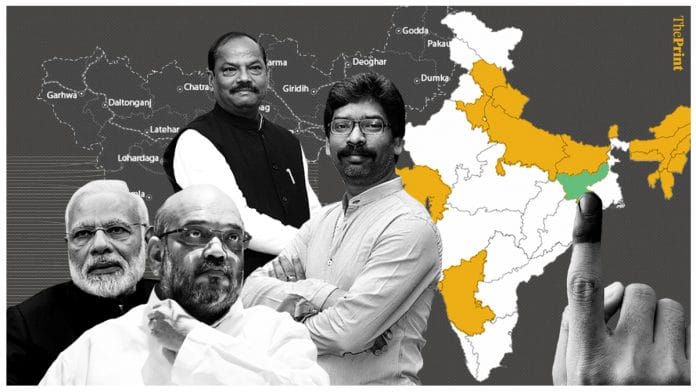The emerging Jharkhand assembly election results show that the Congress-Jharkhand Mukti Morcha with their 40-plus seats is way ahead of the BJP that has so far won 27 seats. After Maharashtra, Haryana, Chhattisgarh, Rajasthan, Madhya Pradesh assembly elections, this is yet another blow for the BJP, which performed stronger than ever in the 2019 Lok Sabha election.
ThePrint asks: BJP loses majority in Jharkhand: Are Modi-Shah no longer decisive factors in state polls?
Modi-Shah can now push BJP centralisation to greater extremes or start giving some autonomy to local leadership
 Gilles Verniers
Gilles Verniers
Co-Director, Trivedi Centre for Political Data and assistant professor, Ashoka University
The BJP’s counter-performance in Jharkhand once again shows that contesting state elections on national issues does not pay off electorally. This result shows that there is no popular endorsement of the national policies that the BJP has been campaigning massively on: the dilution of Article 370 to strip Jammu and Kashmir of its special status, Ram Mandir in Ayodhya, the CAA and the NRC.
Having said that, one should not write off the Narendra Modi-Amit Shah duo because the BJP would have arguably fared worse had the campaign been in less capable hands of the lacklustre and unpopular Chief Minister Raghubar Das. After a close contest in Haryana and the debacle in Maharashtra, it has become clear that the strategy of appointing low-key chief ministers who do not belong to groups that threaten anybody’s influence or representation does not pay off.
The Prime Minister and the Home Minister now have the choice of either pushing the centralisation of the BJP to greater extremes — the route taken by Indira Gandhi in the early 1970s – or to start giving some leeway and autonomy to local leadership. One can argue that it is not the practice of the current BJP leadership to loosen control. This is generating frustration among the local cadre, which feels dispossessed and resents the fact that the party high command virtually decrees an internal emergency within the party’s state unit every time there’s an election.
Jharkhand gave a decisive mandate against BJP because of its anti-tribal policies
 Anshul Avijit
Anshul Avijit
National Spokesperson, Indian National Congress
Jharkhand assembly election results show that the BJP’s anti-tribal policies didn’t work out. The party’s proposed amendments to tenancy laws threatened to take away land from the tribals. People feared that private parties would take away their forests.
Jharkhand has given a decisive mandate to the JMM-Congress alliance. The BJP government’s policies were anti-people. Even the Modi government at the Centre seems to be losing ground among the voters. Its divisive policies have finally been exposed and the people are becoming aware of the BJP’s shortcomings.
Political commentators have maintained that national policies like Article 370, the CAA and Ram Mandir cannot be used to woo voters in state elections. However, this dichotomy is not so straightforward. Once people get to know about certain policies being formulated at the national level, these issues can most definitely find their resonance in state polls. This brewing discontent among people can be converted into a mandate – one that Jharkhand is witnessing today.
Such political trends indicate that the electoral map in India is constantly changing due to people’s resentment against the Modi government.
BJP can continue with its ideological projects, but they won’t work until Modi govt fixes economy
 Rahul Verma
Rahul Verma
Fellow, Centre for Policy Research
The Modi-Shah combination worked really well for the BJP between 2013 and 2018, especially in the states where the party was in opposition. PM Modi brings his personal charisma to the table and Amit Shah has been micro-managing elections for the party. The Modi-Shah duo is still by far the best election team any party can hope for.
Modi has been the best vote aggregator for the BJP. Through his campaign promises, the PM adds new voters to the BJP’s base. However, of late, the BJP has been witnessing electoral reversals at the state level.
Beginning mid-2018, the BJP is contesting in states as an incumbent party. In these elections, voters have judged the BJP based on its performance. This is where Modi’s promises of better governance hit a roadblock. Similarly, Shah, who was helping BJP by cobbling up electoral alliances, is not compromising enough to meet the demands of smaller parties. These alliances were crucial to the BJP’s rise in many states since 2013. As a pre-eminent party, the BJP is not dependent on its allies any more. It has been losing election partners in state after state.
The high-handedness of the BJP in not following coalition-dharma has also forced smaller parties to come together for survival. Moreover, India is facing an unprecedented economic slowdown, which is hurting average voters. The results are a clear signal to the BJP that it should take care of the economy. The BJP can continue with its ideological projects, but they won’t work until the Modi government fixes the stagnating economy.
Many reasons behind these results. BJP will figure them out but wrong to question Modi-Shah’s abilities
 Syed Shahnawaz Hussain
Syed Shahnawaz Hussain
National Spokesperson, BJP
Prime Minister Narendra Modi and Home Minister Amit Shah are still decisive factors in state elections. There are many different reasons behind the results of these state elections. These reasons need to be figured out and discussed by the BJP.
I still believe that the BJP has done good work in these state elections. We have managed to get 25 seats. It is true that we haven’t achieved the results we had hoped for. Somehow, it seems as if our message was not understood by the people. But the BJP leaders will sit together and discuss where we went wrong.
On the question of whether our electoral strategy needs to be reinvented, I think that our strategy is not for anyone else to decide. The BJP will evaluate its future stance and how it should move forward. We are hopeful that the party will only rise from here.
BJP’s chances of registering a decisive win are best when it is in a direct contest with Congress
 Seshadri Chari
Seshadri Chari
Former editor, ‘Organiser’
For anyone with ears close to the ground, Jharkhand assembly election results should not come as a surprise. Unlike the Lok Sabha elections, voters in state elections tend to vote for parties and persons close to their identities like caste and constituency. Also, state-level parties have always had an edge over national parties in local bodies and assembly polls.
The BJP and the Congress appear to have improved their vote percentage this time, which should come as a comfort for both. But by strategically choosing the right coalition partner, the Congress has gained seats at the cost of the BJP, which has lost about a dozen seats from its 2014 tally.
The BJP could have tied up with the Jharkhand Mukti Morcha (with whose support it ran the Arjun Munda-led government earlier); the Jharkhand Vikas Morcha led by Babulal Marandi, a former BJP (and RSS) veteran and first chief minister of Jharkhand; or it could have allied with All Jharkhand students Union.
The BJP’s chances of registering a decisive win or cornering maximum seats are best in a direct contest with the Congress. In smaller states, strategic coalition with regional parties helps national parties to piggy ride on their local popularity.
It is too early to write off the charm and charisma of Narendra Modi or the power of Amit Shah’s Midas touch. But the BJP has to rethink its policy of going alone and start treating regional parties as equal and essential partners in progress rather than necessary evil.
Also read: 5 reasons why Jharkhand assembly election results are crucial for BJP
By Kairvy Grewal, journalist at ThePrint







extremely divisive politics even in diverse country like India would have succeeded if economy did well. but regressive ideology can only lead to regression in economy..
Ms Seema Chishti has tweeted : The dreaded four – letter word appears at a protest. # IndiaGate. JOBS.
Local issues matter more than escoteric projects like CAA, turbocharged with NRC, a Ram Mandir whose electoral significance ended on 6th December, 1992, upending a historical compact embedded in Article 370 without any idea of what would replace it. 2. Ambassador M K Bhadrakumar ends a somewhat glum assessment of Indian foreign policy with a sentence that extends well beyond its confines : The past five years were spent on a futile attempt at dissimulation to introduce Hindutva, an atavistic ideology of mofussil grade, onto the metropolitan global stage. 3. Clearly, the priorities of the government and the governed are widely divergent. Expect more disappointing verdicts if the economy does not come out of the ICU.
But Congress cannot simply celebrate, it is state election where arithmetic works very well. At the same time BJP cannot overuse Modi and now joined by Shah. Both are behaving like Indira Gandhi, not allowing Regional leaders to grow. A clear warning signs for up coming elections from 2020 onwards.